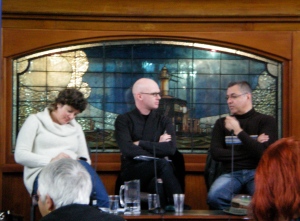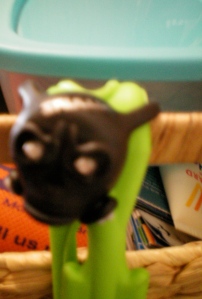Blue skies and a ‘Let’s Be frankie‘ panel lured me and my bike out to Williamstown on Saturday. I didn’t think I’d make it back home before sunset, so I picked up these cute bike lights along the way:
On my ride, I caught the Westgate Punt, a scenic shortcut across the water. It was temporarily commandeered by someone’s youngster, but I arrived safely at the Scienceworks Museum and continued along the coastal trail.
At the ‘Let’s Be frankie‘ session, frankie senior contributors Marieke Hardy and Benjamin Law described the magazine as frank articles plus cupcakes, craft, and rock & roll. Having never read or seen frankie, I started picturing shots of pink teacups, jauntily arranged on astroturf, juxtaposed next to awkward descriptions of bodily functions. Having written about personal experiences such as losing one’s virginity, Benjamin and Marieke discussed the ‘illusion of intimacy’* that they had manufactured. Marieke also used to blog; only 20% of her personal life became blog fodder, though her parents did develop a catchphrase rather like ‘and that’s not going in the blog’.
I returned the next day for ‘From the Quill to the Kindle‘, a much more formal discussion between Sophie Cunningham, Chris Flynn, and Dmetri Kakmi about the so-called death of the book and eBook revolution.

left to right: Sophie Cunningham, Chris Flynn, and Dmetri Kakmi @ 'From the Quill to the Kindle' (2/5/10)
Working from a prepared speech, Dmetri described eBook trends that defied initial suppositions. Prime eBook consumers were not sci-fi/fantasy-reading, tech-savy geeks but tended to be thirty-five-to-forty-year-old females with tastes that reflected their hardcopy-buying counterparts.
Chris Flynn brought up environmental concerns. In a 2006 report, it was revealed that recycled paper makes up only 5-10% of books published in the US**. Publishers are aiming to improve this figure, but this means that thirty million trees are cut down each year for US books alone**. Our habit of collecting our favourite books is a selfish one.
Technology, however, is dictating the terms of the alternative. While you may own a physical book, you can never own an eBook, only the right to keeping a copy of it. If you breach your contract with Amazon, the copies get wiped. In other words, you can lend your Kindle to a friend, but you can’t let them borrow a copy of your favourite book. Libraries are screwed in this electronic universe, and writers/publishers can do little to help them, unless they release an open source version of their book.
Meanwhile, Sophie Cunningham examined how eBooks and eReaders may change reading/writing habits. Podcasts have already revived the audio book. Will access to social media on devices such as the iPad affect the way we read? Will collaborative processes, such as commenting/feedback on uploaded drafts, change the writing process? Computers certainly have. In the past, typewriting forced people to recreate drafts from scratch, whilst computers allowed for more sloppier writing via ‘cut and paste’ methods. Sophie hoped that the novel will survive this eReader revolution as a rarified form.
‘From the Quill to the Kindle‘ managed to outline what seems to be a mammoth topic. There’s a plethora of articles on eBooks available on the interwebs. Try ‘Publish or Perish: Can the iPad topple the Kindle, and save the book business?‘ (via theliftedbrow), and ‘Amazon Erases Orwell Books from Kindles‘ for starters.
After Willylitfest *giggle*, I went down to Gem Pier with my fellow literary punters who nearly incited a seagull riot with their chips. I have not seen The Birds, but seagulls are scary in numbers.
*Benjamin and Marieke also mentioned ‘frankie girls’ but never satisfactorarily explained the term. I did a Google search and found this.
**Figures confirmed via ecolibris.net.


